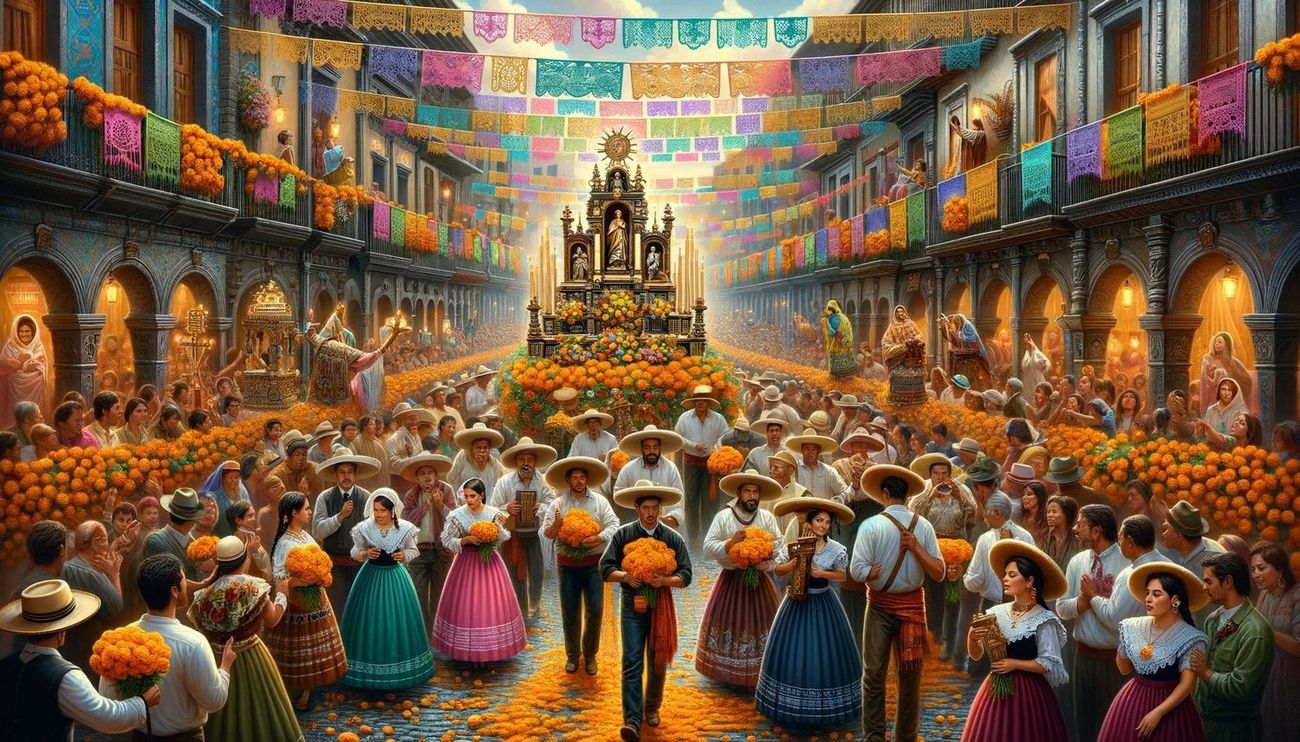Home>Special Themes>What Is Lent Called In French


Special Themes
What Is Lent Called In French
Published: February 27, 2024
Peter Smith, Editorial Director at Christian.net, combines deep insights into faith, politics, and culture to lead content creation that resonates widely. Awarded for his contributions to religious discourse, he previously headed a major organization for religious communicators, enhancing dialogue on faith's societal impacts.
Discover what Lent is called in French and explore special themes related to this religious observance. Learn about the significance and traditions of Lent in French culture.
(Many of the links in this article redirect to a specific reviewed product. Your purchase of these products through affiliate links helps to generate commission for Christian.net, at no extra cost. Learn more)
Table of Contents
Introduction
What is Lent called in French? Lent is known as "le Carême" in French. It is a significant period in the Christian calendar, especially in Catholicism, and is observed with various traditions and customs in France. The observance of Lent in French culture holds deep religious and cultural significance, and understanding its meaning and practices can provide valuable insights into the religious and social fabric of the country. In this article, we will explore the meaning of Lent in French, the traditions and customs associated with it, and the significance of this observance in French culture.
Read more: What Is The Fourth Sunday Of Lent Called?
The Meaning of Lent in French
Lent, known as "le Carême" in French, holds a profound significance in the religious and cultural context of France. This period, lasting for 40 days, represents the 40 days that Jesus spent fasting in the desert. It is a time of reflection, repentance, and spiritual growth for Christians. The word "Carême" itself has roots in the Latin word "quadragesima," which means "fortieth," signifying the 40 days of fasting and preparation for Easter. The observance of Lent in French culture is deeply rooted in the traditions of the Catholic Church, and it serves as a time for believers to engage in prayer, penance, and almsgiving as they prepare for the celebration of Easter.
- Lent is known as "le Carême" in French.
- It lasts for 40 days, symbolizing Jesus' 40 days of fasting in the desert.
- The word "Carême" is derived from the Latin "quadragesima," meaning "fortieth."
- It is a period of reflection, repentance, and spiritual growth for Christians.
- The observance of Lent in French culture is closely tied to the traditions of the Catholic Church.
Lent, or "le Carême," is a time for believers to engage in self-examination, introspection, and spiritual discipline. It is a period of abstinence and moderation, where individuals may choose to give up certain luxuries or habits as a form of sacrifice and devotion. The meaning of Lent in French encompasses a sense of self-denial and a focus on spiritual renewal. Through prayer, fasting, and acts of charity, believers seek to deepen their connection with their faith and prepare themselves for the joyous celebration of Easter.
- It is a time for self-examination, introspection, and spiritual discipline.
- Individuals may choose to give up luxuries or habits as a form of sacrifice.
- Lent in French emphasizes self-denial and spiritual renewal.
- Believers engage in prayer, fasting, and acts of charity to deepen their connection with their faith.
In French culture, the meaning of Lent extends beyond its religious significance. It is a time when communities come together to support one another in their spiritual journeys. The observance of Lent fosters a sense of solidarity and shared commitment to living a life of faith and compassion. The traditions and customs associated with Lent in France reflect this communal spirit, as individuals and families participate in religious services, charitable activities, and communal meals that emphasize the values of humility, generosity, and empathy.
- Lent in French culture fosters a sense of solidarity and shared commitment to faith.
- Traditions and customs associated with Lent reflect a communal spirit.
- Individuals and families participate in religious services, charitable activities, and communal meals.
- Lent emphasizes the values of humility, generosity, and empathy in French culture.
Traditions and Customs During Lent in France
During the Lenten season in France, various traditions and customs are observed, reflecting the cultural and religious significance of this period. These practices not only deepen the spiritual experience but also bring communities together in shared observance and reflection.
-
Fasting and Abstinence: One of the central customs during Lent in France is the practice of fasting and abstinence. Many Catholics abstain from consuming meat on Ash Wednesday and Fridays during Lent, opting for fish or vegetarian meals. This tradition of dietary restraint is a symbolic way of honoring Jesus' sacrifice and demonstrating self-discipline.
-
Lenten Foods: Throughout the Lenten season, certain traditional foods hold special significance in French culture. Pastries and desserts, such as the delectable "galette des rois" (king cake), are enjoyed during the period leading up to Lent. Additionally, the consumption of crepes on "Chandeleur," also known as Candlemas, marks the transition from the Christmas season to the beginning of Lent.
-
Religious Observances: The Lenten period in France is marked by an increase in religious observances and church services. Many churches hold special masses, prayer vigils, and processions, providing opportunities for believers to deepen their spiritual connection and engage in communal worship. The Stations of the Cross, a devotional practice depicting Jesus' journey to the crucifixion, are often reenacted or meditated upon during Lent.
-
Charitable Acts: Acts of charity and almsgiving are integral to the Lenten observance in France. Many communities organize charitable initiatives, such as food drives, fundraisers for those in need, and volunteer efforts to support the less fortunate. These acts of generosity and compassion align with the spirit of Lent, emphasizing the importance of selflessness and caring for others.
-
Carnival Celebrations: While not directly part of the Lenten observance, the festive carnival celebrations that precede Lent, particularly in regions such as Nice and Dunkirk, hold cultural significance. These vibrant and colorful events, featuring parades, music, and masquerade, serve as a joyful prelude to the solemnity of the Lenten season.
-
Easter Preparation: As Lent progresses, preparations for Easter, the culmination of the Lenten journey, become more prominent. Families engage in the tradition of decorating Easter eggs and preparing special meals to be shared on Easter Sunday. The anticipation of Easter serves as a source of hope and joy, underscoring the transformative nature of the Lenten observance.
The traditions and customs observed during Lent in France reflect a blend of religious devotion, cultural heritage, and communal solidarity. Through fasting, religious observances, acts of charity, and the anticipation of Easter, the Lenten season in France holds a special place in the hearts of believers and communities, fostering a sense of spiritual renewal and shared reverence.
The Significance of Lent in French Culture
The significance of Lent in French culture extends far beyond its religious connotations, permeating various aspects of societal and communal life. This period of spiritual observance holds profound significance in shaping the cultural identity and values of the French people.
1. Cultural Heritage
Lent, known as "le Carême" in French, is deeply ingrained in the cultural heritage of France. The traditions and customs associated with Lent have been passed down through generations, contributing to the rich tapestry of French cultural practices. From culinary traditions to religious observances, the significance of Lent is interwoven with the historical and cultural fabric of the nation.
Read more: Why Is It Called Lent?
2. Culinary Traditions
In French culture, the observance of Lent is accompanied by unique culinary traditions that reflect the significance of this period. The consumption of specific foods, such as crepes on "Chandeleur" and the indulgence in king cake, symbolizes the transition from the festive indulgence of the Christmas season to the period of restraint and reflection during Lent. These culinary practices not only showcase the diversity of French cuisine but also serve as a reminder of the cultural significance of Lent in shaping dietary customs.
3. Communal Solidarity
Lent fosters a sense of communal solidarity and shared commitment to spiritual growth within French society. The observance of Lent brings communities together, encouraging acts of charity, support for those in need, and participation in religious services. This communal spirit underscores the significance of Lent as a time for collective reflection, compassion, and mutual support, reinforcing the bonds that unite individuals and families across France.
4. Reflection and Renewal
The significance of Lent in French culture lies in its emphasis on introspection, self-discipline, and spiritual renewal. It provides an opportunity for individuals to engage in self-examination, reevaluate their priorities, and deepen their connection with their faith. The period of Lent serves as a cultural reminder of the importance of personal growth, humility, and the pursuit of spiritual fulfillment, transcending religious boundaries to resonate with a broader cultural ethos.
5. Symbolism and Tradition
Lent holds symbolic significance in French culture, representing a period of transition, sacrifice, and anticipation. The symbolism of Lent is woven into various cultural practices, from the observance of Ash Wednesday to the preparation for Easter. These traditions and rituals serve as a testament to the enduring cultural significance of Lent, embodying the values of faith, perseverance, and the celebration of renewal.
In essence, the significance of Lent in French culture encompasses a multifaceted tapestry of traditions, values, and communal expressions. It serves as a testament to the enduring influence of religious observance on the cultural identity of France, shaping the collective consciousness and fostering a sense of shared heritage and spiritual commitment.
Read more: What Is The First Day Of Lent Called?
Conclusion
In conclusion, the observance of Lent, known as "le Carême" in French, holds profound significance in both the religious and cultural landscape of France. The meaning of Lent in French encompasses a period of reflection, repentance, and spiritual growth, symbolizing the 40 days that Jesus spent fasting in the desert. The traditions and customs associated with Lent in France, including fasting, religious observances, culinary traditions, acts of charity, and communal solidarity, reflect the deep-rooted cultural heritage and values of the nation. Lent serves as a time for individuals and communities to come together in shared observance, fostering a sense of spiritual renewal, cultural identity, and communal solidarity. The significance of Lent in French culture extends beyond its religious origins, permeating various aspects of societal life and shaping the collective consciousness of the French people. As such, the observance of Lent in France stands as a testament to the enduring influence of religious tradition on the cultural identity and values of the nation.













